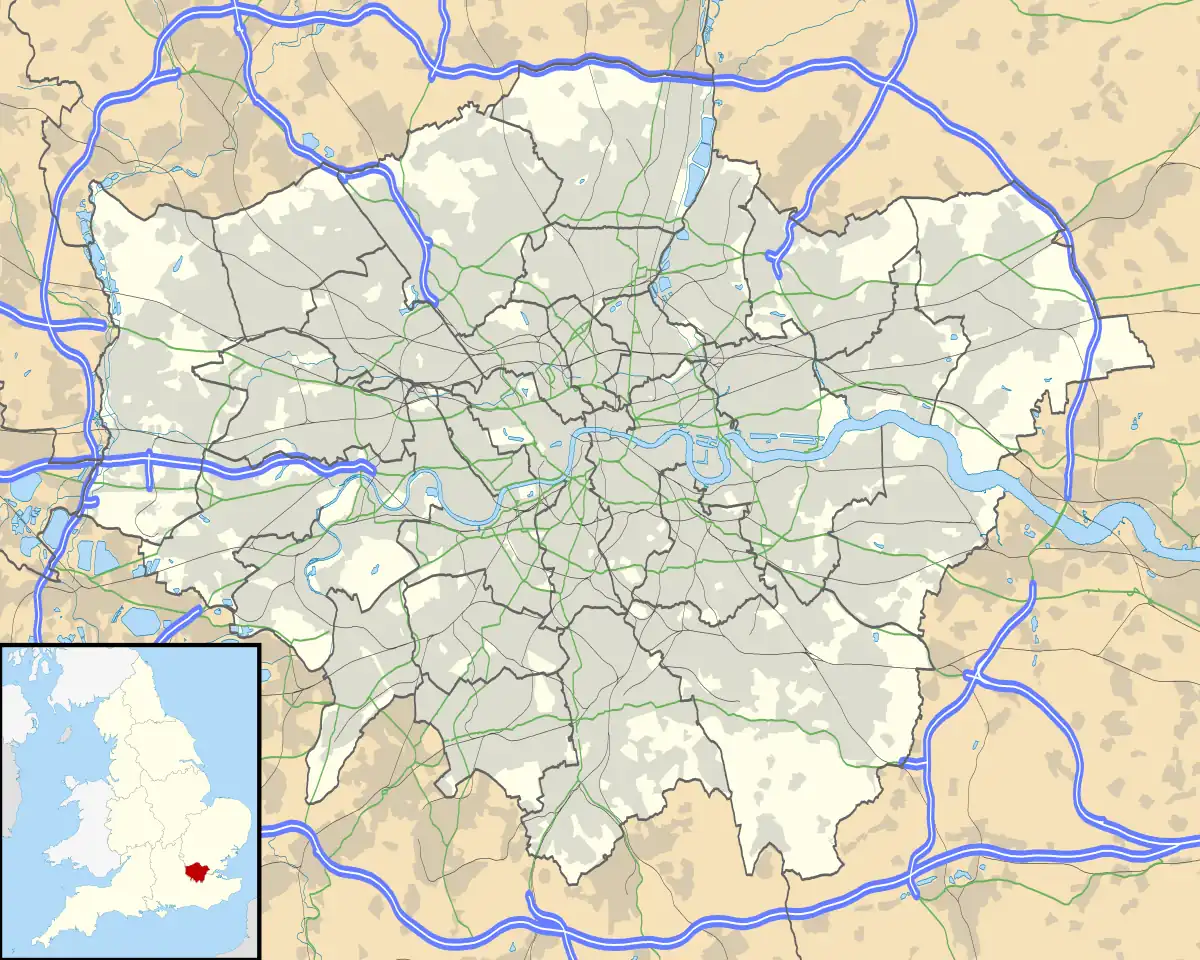| Langdon Park | |
|---|---|
 Langdon Park station entrance | |
 Langdon Park Location of Langdon Park in Greater London | |
| Location | Poplar |
| Local authority | London Borough of Tower Hamlets |
| Managed by | Docklands Light Railway Ltd |
| Owner | Transport for London |
| Number of platforms | 2 |
| Accessible | Yes[1] |
| Fare zone | 2 |
| DLR annual boardings and alightings | |
| 2018 | |
| 2019 | |
| 2020 | |
| 2021 | |
| 2022 | |
| Key dates | |
| 9 December 2007 | Opened |
| Other information | |
| WGS84 | 51°30′55″N 0°00′51″W / 51.515173°N 0.014119°W |
Langdon Park is a Docklands Light Railway (DLR) station in Poplar in Greater London, England. The station is between All Saints and Devons Road stations on the Stratford-Lewisham Line. Construction of the infill station began on 17 November 2006,[7] and the first day of operation was 9 December 2007.[8][9]
History and proposals
When planning the Stratford branch of the Docklands Light Railway, two station sites were safeguarded to be used much later when the system was developed. One of these stations was Pudding Mill Lane, which opened in 1996. The other station was provisionally called Carmen Street.[10] This was changed to Langdon Park, following the name of the adjacent park and Langdon Park School.
Proposals for design of Langdon Park were first drawn up in 2000 but due to lack of funding, amongst other things, the scheme was dropped. In May 2000, Leaside Regeneration Limited and Docklands Light Railway Limited (DLRL) jointly funded preliminary feasibility work looking at locations, outline costs and Docklands Light Railway implications of a new station between the existing All Saints and Devons Road DLR stations, which had one of the longest gaps in the DLR network.[11] The research indicated that the best and most practical location would be at the pedestrian bridge linking Carmen Street on Lansbury Estate and Bright Street adjacent to Langdon Park itself.
In June 2005, DLRL re-engaged consultants to reassess the scheme costs and design with a view to developing the project for a planning application submission. Following the successful outcome of a bid for funding from the Office of the Deputy Prime Minister (ODPM), the predecessor department of Communities and Local Government, planning permission was applied for and subsequently granted. Construction took just over a year and cost £10.5 million.[12] The Mayor of London presided over the station opening ceremony on 10 December 2007, although the station actually came into public use the day before.[12]

Design
The station has 90 m (300 ft) platforms connected by a lightweight transparent replacement bridge link from Carmen Street and Hay Currie Street that were all pre-fabricated off-site and lifted into position over two weekends to reduce service disruption.
The station is fully accessible from street level and the bridge has two lift shafts at either end to provide access to the station.
The station was designed by Consarc Architects.
The station features three art installations by British artist Kate Davis.[13] These include Whoosh, a large word sculpture clearly visible from either platform.
Services
The typical off-peak service in trains per hour from Langdon Park is:[14]
- 12 tph to Stratford
- 12 tph to Canary Wharf
Additional services call at the station during the peak hours, increasing the service to up to 16 tph in each direction, with up to 8 tph during the peak hours extended beyond Canary Wharf to and from Lewisham.
| Preceding station | Following station | |||
|---|---|---|---|---|
| All Saints towards Lewisham |
Docklands Light Railway | Devons Road towards Stratford |
Connections
The station is directly served by London Buses routes 108 and indirectly by the 309. Additionally the 108 has a 24-hour service.[15][16]
References
- ↑ "Step free Tube Guide" (PDF). Transport for London. April 2021. Archived (PDF) from the original on 15 May 2021.
- ↑ "Station Usage Data" (XLSX). Usage Statistics for London Stations, 2018. Transport for London. 23 September 2020. Retrieved 9 January 2022.
- ↑ "Station Usage Data" (XLSX). Usage Statistics for London Stations, 2019. Transport for London. 23 September 2020. Retrieved 9 January 2022.
- ↑ "Station Usage Data" (XLSX). Usage Statistics for London Stations, 2020. Transport for London. 16 April 2021. Retrieved 9 January 2022.
- ↑ "Station Usage Data" (XLSX). Usage Statistics for London Stations, 2021. Transport for London. 12 July 2022. Retrieved 7 September 2022.
- ↑ "Station Usage Data" (XLSX). Usage Statistics for London Stations, 2022. Transport for London. 4 October 2023. Retrieved 20 October 2023.
- ↑ "Work begins on new DLR station at Langdon Park". Transport for London. 17 November 2006. Archived from the original on 30 September 2007. Retrieved 11 October 2007.
- ↑ "New Docklands Light Railway station opens at Langdon Park". Transport for London. 10 December 2007. Archived from the original on 12 December 2007. Retrieved 10 December 2007.
- ↑ "Langdon Park Docklands Light Railway station opens". Transport Briefing. 10 December 2007. Archived from the original on 15 May 2007. Retrieved 10 December 2007.
- ↑ The DLR Story Archived 4 March 2016 at the Wayback Machine
- ↑ "DLR Project Updates for Langdon Park Station". Archived from the original on 11 June 2009.
- 1 2 Mayor unveils new London station. BBC News. 10 December 2007.
- ↑ Kate Davis: Langdon Park Station Archived 5 October 2013 at the Wayback Machine. DLR Public Arts Programme. Retrieved 4 October 2013.
- ↑ "DLR train timetables". Transport for London. Retrieved 15 August 2023.
- ↑ "Changes to routes 108 and D8 in Bow and Stratford" (PDF). Archived (PDF) from the original on 10 October 2016. Retrieved 9 October 2016.
- ↑ "Langdon Park Station". Archived from the original on 14 September 2016. Retrieved 3 September 2016.
External links
- Station Facilities: Langdon Park, Transport for London
- Langdon Park at DLR Project Archives